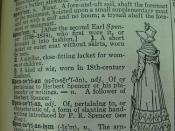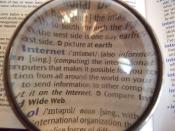Double-decker Definitions: the Role of Frames in Meaning Explanations
There are certain kinds of structured background information (or "frames") should be treated as essential components or accompaniments of word definitions.1 For ordinary print dictionaries, the provision of such information would amount to a very large investment. Market limitations on the price of the book or on the size of the budget that can be devoted to a given dictionary project, as well as realistic expectations of the patience of the anticipated users, make it unlikely that one can incorporate even greatly abbreviated frame information into individual dictionary entries. Instead, we should be thinking in terms of a dictionary on compact disk or preferably a web utility with hyperlinks facilitating easy access to the necessary background information. Since a single background frame, entered only once, can serve many word senses, its description could be made accessible from all of the relevant entries; it does not need to occupy space within the text of individual entries.
Thus, a dictionary user who did not know about the tradition of the seven-day week should be able to get quick access to the necessary information from the entries of any one of the weekday names or from semantically related words such as week, hebdomad, weekend, and fortnight.
Supposing that one can provide such information, how could it become a part of the ordinary dictionary user's experience? The sheer magnitude of a project capable of producing a full registry of frame information precludes the possibility of any single publisher's creating a database of the needed kind, but because such information will ultimately be needed for a great many natural language-processing applications, it should in principle be possible to fund the creation of such a resource by a large (and generous) consortium of academic, governmental, and...


